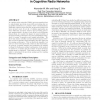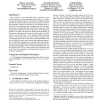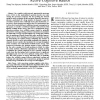35 search results - page 4 / 7 » Learning Interference Strategies in Cognitive ARQ Networks |
126
click to vote
GLOBECOM
2007
IEEE
15 years 6 months ago
2007
IEEE
— In this paper, we investigate the channel selection strategy for secondary users in cognitive radio networks. We claim that in order to avoid the costly channel switchings, a s...
107
click to vote
MOBICOM
2009
ACM
15 years 6 months ago
2009
ACM
In cognitive radio networks (CRNs), spectrum sensing is key to opportunistic spectrum access while preventing any unacceptable interference to primary users’ communications. Alt...
109
click to vote
MOBICOM
2009
ACM
15 years 6 months ago
2009
ACM
The coexistence of two unlicensed links is considered, where one link interferes with the transmission of the other, over a timevarying, block-fading channel. In the absence of fa...
121
click to vote
INFOCOM
2009
IEEE
15 years 6 months ago
2009
IEEE
— Collaborative spectrum sensing among secondary users (SUs) in cognitive networks is shown to yield a significant performance improvement. However, there exists an inherent tra...
129
Voted
TSP
2012
13 years 7 months ago
2012
—In a cognitive radio network, opportunistic spectrum access (OSA) to the underutilized spectrum involves not only sensing the spectrum occupancy but also probing the channel qua...



